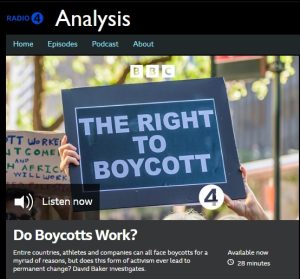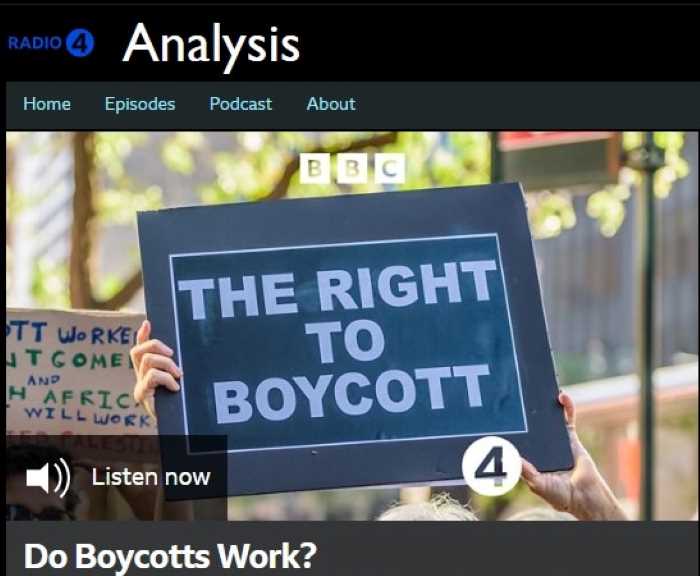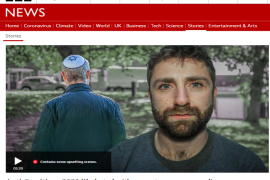An episode of the BBC Radio 4 programme ‘Analysis’ titled ‘Do Boycotts Work?’ which was first broadcast in early June was aired again on August 14th.
“Boycotts are big at the moment. On a global scale, many countries are boycotting Russia following its invasion of Ukraine. There are campaigns to boycott products produced in Turkey, Israel or China. Sporting boycotts are used by countries across the world to express their displeasure with their international rivals. And there are plenty of boycotts going on against companies, over working practices, supply chains and political stances.
But international boycotts can be easily circumvented, and we can choose alternative products if we don’t like a particular manufacturer. So is this low risk activism, or is it an effective way for ordinary people to hold businesses and nations to account? Do boycotts ever lead to permanent change?
Above all, do they work? Journalist and writer David Baker investigates.”
That 28-minute programme included nine contributors, one of whom was featured for over three minutes in a section [from 21:06] introduced by David Baker as follows:
Baker: “And even the UK government seems to think boycotts are political. It’s proposing a bill in Parliament that would prevent public bodies from joining an international boycott without central government approval.”
Details of the Economic Activity of Public Bodies (Overseas Matters) Bill can be found here.
Ignoring BBC editorial guidelines concerning contributors’ affiliations, Baker continued:
Baker: “Ben Jamal is director of the Palestine Solidarity Campaign; one of about sixty organisations that have got together to campaign against the proposed legislation.”
The BBC states:
“It’s important that we make sure our audiences are told any relevant context about the contributors or experts that feature in our output. With individual contributors it may mean making clear, if appropriate, for instance that they are active members of organisations such as political groups. It may also be necessary to corroborate any claims that are made that are significant or substantial.
We also should not automatically assume that contributors from other organisations (such as academics, journalists, researchers and representatives of charities and think-tanks) are unbiased. Appropriate information about their affiliations, funding and particular viewpoints should be made available to the audience, when relevant to the context.”
Listeners were however given no information whatsoever about the Palestine Solidarity Campaign, including its opaque funding, its support for the Boycott, Divestment and Sanctions campaign, its anti-Israel activities or its record of antisemitism.
Neither were listeners informed that the “about sixty organisations” campaigning along with the PSC against the proposed legislation includes blatantly political groups with records of anti-Israel and pro-BDS activity such as the Amos Trust, Artists for Palestine UK, BRICUP, the British Palestinian Committee, ICHAD, Jews for Justice for Palestinians, Jewish Voice for Labour, the Muslim Association of Britain, Na’amod, Friends of Al Aqsa, the Hamas-linked Palestinian Forum in Britain, the Scottish PSC, Sabeel–Kairos, the Stop the War Coalition and War on Want.
Coincidentally or not, the title of that campaign against the proposed bill is ‘Right to Boycott’ – the same phrase which appears in the edited version of a 2016 photograph on the programme’s homepage.
Clearly such information about the promoters of an obviously political campaign was precisely the type of “relevant context” which should have been provided to listeners before they heard the contribution from Ben Jamal.
Jamal: “What that means is that a public body – so let’s say the local government pension scheme that’s deciding how is it going to invest the pension funds of local authority employees – if they decide we are not going to invest funds in this particular company because it’s complicit in supporting violations of international law by a state, they cannot make that decision unless the government itself has said we are going to introduce sanctions against that state.”
Baker failed to ask Jamal on what basis it would be determined whether or not a state has violated international law, given the manner in which such often baseless accusations are regularly bandied about by precisely the type of political NGOs opposing this legislation.
Baker: “Some people would say is it really the job of local authorities to decide on international sanctions? Isn’t that really the job of the foreign office?”
Jamal: “Well that is part of the argument that the government is trying to make. Part of what the government is saying is you should trust us. We should be the arbiters of whether or not a company is supporting violations of international law, whether a particular state is doing that. Well I think anybody who studies history will know that successive UK governments have sometimes been very clear in their support for international law when they’ve taken action against states that violate international law and in other situations have ignored violations or even supported violations of international law.”
Baker: “The Department for Levelling Up, Housing and Communities has told us in a statement that it remains committed to the government’s manifesto pledge to ban public bodies from imposing their own boycotts and it added ‘we are firmly opposed to local boycotts, which can damage integration and community cohesion, hinder exports and harm our economic security’. Boycotts may feel like an odd thing for a government to be getting involved with but actually we’ve been here before, back during that boycott of South Africa.”
Jamal: “The only precedent for a UK government introducing a law like the current government is planning to introduce was Margaret Thatcher’s government in the 1980s trying to introduce regulations to stop local authorities supporting the boycott and divestment from South Africa.”
Baker: “And what happened to that legislation under Margaret Thatcher?”
Jamal: “Well it was effectively subverted by local authorities who simply refused to comply with it.”
The conversation then moved into unrelated realms.
Baker: “But what about the argument that if we don’t like the decisions our government makes, we should just vote it out at the next election?”
Jamal: “That argument that the democratic functions [unintelligible] is solely the ability to vote a government in or out could be used as an argument for example to justify the government saying well we’re gonna ban all forms of protest because you don’t need to protest, you don’t need to be out on the streets protesting and making arguments. You can just decide whether or not you want to vote us in again in five years’ time.”
Obviously the part of David Baker’s programme relating to the topic of proposed legislation which is currently pertinent to domestic BBC audiences failed to adequately inform, not least because – as is all too often the case – Baker and his production team completely ignored BBC editorial guidelines concerning contributors’ affiliations.
Related Articles:
MUSLIM BROTHERHOOD? ANTISEMITES? MEET THE GUARDIAN’S ‘CIVIL SOCIETY’
BBC NEWS RECYCLES SOME OF ITS PREVIOUS BDS WHITEWASHING CAMPAIGNS






Every UK citizen should do all in their power to avoid contributing £159 to a bloodthirsty medium that is hell-bent on the destruction of Israel and Judaism following orders from a foreign power.